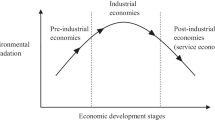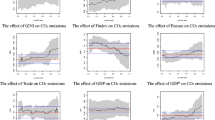Abstract
This paper illustrates the direct and indirect effects of democracy on CO2 emissions in the BRICS countries (Brazil, Russia, India, China, and South Africa) from 1992 to 2018. In view of the distribution heterogeneity of CO2 emissions, the panel quantile regression model is especially used to explore the nexus among different variables. Furthermore, in order to predict the trends of CO2 emissions in different countries, we also estimate the kernel density function of CO2 emissions in the BRICS countries by the quantile-fitted values. The results indicate that the direct impact of democracy on carbon dioxide emissions is significantly negative and great at high-emission countries. Although the indirect effect of democracy is positive in China and negative in Brazil and South Africa, the total effect of democracy on CO2 emissions remains negative in all BRICS countries. The estimation of kernel density function shows that the distribution of CO2 emissions in each country is gradually concentrated. Moreover, there is an environmental Kuznets curve depicting the linkage of urbanization and carbon dioxide emissions in Brazil and South Africa. These findings further highlight that the impact of democracy on high-emission and low-emission countries should be taken into account in policymaking to achieve sustainable developments.




Similar content being viewed by others
References
Acemoglu D, Johnson S, Robinson JA, Yared P (2008) Income and democracy. Am Econ Rev 98(3):808–842
Acemoglu D, Naidu S, Restrepo P, Robinson JA (2019) Democracy does cause growth. J Polit Econ 127(1):47–100
Adams S, Acheampong AO (2019) Reducing carbon emissions: the role of renewable energy and democracy. J Clean Prod 240:118245
Ali FA, Fiess N, MacDonald R (2010) Do institutions matter for foreign direct investment? Open Econ Rev 21(2):201–219
Ali HS, Abdul-Rahim AS, Ribadu MB (2017) Urbanization and carbon dioxide emissions in Singapore: evidence from the ARDL approach. Environ Sci Pollut Res 24(2):1967–1974
Amemiya T (1982) Two stage least absolute deviations estimators. Econometrica 50:689–711
Aziz OG (2018) Institutional quality and FDI inflows in Arab economies. Financ Res Lett 25:111–123
Baltagi B (2008) Econometric analysis of panel data. Wiley, New York
Barro RJ (1996) Democracy and growth. J Econ Growth 1(1):1–27
Beck N, Katz JN (1995) What to do (and not to do) with time-series cross-section data. Am Polit Sci Rev 89(3):634–647
Binder M, Coad A (2011) From average Joe’s happiness to miserable Jane and cheerful John: using quantile regressions to analyze the full subjective well-being distribution. J Econ Behav Organ 79(3):275–290
Breitung J, Das S (2005) Panel unit root tests under cross-sectional dependence. Stat Neerl 59(4):414–433
Broderstad TS (2018) A meta-analysis of income and democracy. Democratization 25(2):293–311
Buchanan BG, Le QV, Rishi M (2012) Foreign direct investment and institutional quality: some empirical evidence. Int Rev Financ Anal 21:81–89
Burton E (2000) The compact city: just or just compact? A preliminary analysis. Urban Stud 37(11):1969–2006
Canay IA (2011) A simple approach to quantile regression for panel data. Econ J 14(3):368–386
Capello R, Camagni R (2000) Beyond optimal city size: an evaluation of alternative urban growth patterns. Urban Stud 37(9):1479–1496
Cetin MA, Bakirtas I (2019) The long-run environmental impacts of economic growth, financial development, and energy consumption: evidence from emerging markets. Energ Environ:0958305X1988237. https://doi.org/10.1177/0958305X19882373
Cole MA (2007) Corruption, income and the environment: an empirical analysis. Ecol Econ 62(3):637–647
Cowan WN, Chang T, Inglesi-Lotz R, Gupta R (2014) The nexus of electricity consumption, economic growth and CO2 emissions in the BRICS countries. Energ Policy 66:359–368
Crenshaw EM, Jenkins JC (1996) Social structure and global climate change: sociological propositions concerning the greenhouse effect. Sociol Focus 29(4):341–358
Damette O, Delacote P (2012) On the economic factors of deforestation: what can we learn from quantile analysis? Econ Model 29(6):2427–2434
Dasgupta P, Mäler KG (1995) Poverty, institutions, and the environmental resource-base. Handb Dev Econ 3:2371–2463
Dauda L, Long X, Mensah CN, Salman M (2019) The effects of economic growth and innovation on CO2 emissions in different regions. Environ Sci Pollut Res 26(15):15028–15038
Desai R M, Olofsgård A, Yousef T M (2003) Democracy, inequality, and inflation. Am Polit Sci Rev 97(3):391–406
Dogan E, Seker F, Bulbul S (2017) Investigating the impacts of energy consumption, real GDP, tourism and trade on CO2 emissions by accounting for cross-sectional dependence: a panel study of OECD countries. Curr Issue Tour 20(16):1701–1719
Doucouliagos H, Ulubaşoğlu MA (2008) Democracy and economic growth: a meta-analysis. Am J Polit Sci 52(1):61–83
Gasiorowski MJ (2000) Democracy and macroeconomic performance in underdeveloped countries: an empirical analysis. Comp Polit Stud 33(3):319–349
Hanif I (2018) Impact of fossil fuels energy consumption, energy policies, and urban sprawl on carbon emissions in East Asia and the Pacific: a panel investigation. Energy Strateg Rev 21:16–24
Haseeb A, Xia E, Baloch MA et al (2018) Financial development, globalization, and CO2 emission in the presence of EKC: evidence from BRICS countries. Environ Sci Pollut Res 25(31):31283–31296
He Y, Xu Q, Wan J, Yang S (2016) Short-term power load probability density forecasting based on quantile regression neural network and triangle kernel function. Energy 114:498–512
Jacobi P, Kjellen M, McGranahan G et al (2010) The citizens at risk: from urban sanitation to sustainable cities. Routledge
Jaunky VC (2013) Democracy and economic growth in sub-Saharan Africa: a panel data approach. Empir Econ 45(2):987–1008
Joshi P, Beck K (2018) Democracy and carbon dioxide emissions: assessing the interactions of political and economic freedom and the environmental Kuznets curve. Energy Res Soc Sci 39:46–54
Kelejian HH (1971) Two-stage least squares and econometric systems linear in parameters but nonlinear in the endogenous variables. J Am Stat Assoc 66(334):373–374
Kim TH, Muller C (2019) Inconsistency transmission and variance reduction in two-stage quantile regression. Commun Stat Simul Comput:1–34
Koenker R (2004) Quantile regression for longitudinal data. J Multivar Anal 91(1):74–89
Kolko J (2010) Urbanization, agglomeration, and coagglomeration of service industries. In: Glaeser EL (ed) The economics of agglomeration. University of Chicago Press, Chicago, pp 151–180
Kotov V, Nikitina E (1995) Russia and international environmental cooperation. Green globe yearbook of international cooperation on environment and development: 17-17
Lamarche C (2010) Robust penalized quantile regression estimation for panel data. J Econ 157(2):396–408
Lamarche C (2011) Measuring the incentives to learn in Colombia using new quantile regression approaches. J Dev Econ 96(2):278–288
Lancaster T (2000) The incidental parameter problem since 1948. J Econ 95(2):391–413
Leitao A (2010) Corruption and the environmental Kuznets curve: empirical evidence for sulfur. Ecol Econ 69(11):2191–2201
Levin A, Lin CF, Chu CSJ (2002) Unit root tests in panel data: asymptotic and finite-sample properties. J Econ 108(1):1–24
Li Q, Reuveny R (2006) Democracy and environmental degradation. Int Stud Q 50(4):935–956
Lipset SM (1959) Some social requisites of democracy: economic development and political legitimacy. Am Polit Sci Rev 53(1):69–105
Lv Z (2017) The effect of democracy on CO2 emissions in emerging countries: does the level of income matter? Renew Sust Energ Rev 72:900–906
Mak Arvin B, Lew B (2011) Does democracy affect environmental quality in developing countries? Appl Econ 43(9):1151–1160
Martínez-Zarzoso I, Maruotti A (2011) The impact of urbanization on CO2 emissions: evidence from developing countries. Ecol Econ 70(7):1344–1353
Michaels G, Rauch F, Redding SJ (2012) Urbanization and structural transformation. Q J Econ 127(2):535–586
Midlarsky MI (1998) Democracy and the environment: an empirical assessment. J Peace Res 35(3):341–361
Mol APJ, Spaargaren G (2000) Ecological modernisation theory in debate: a review. Environ Polit 9(1):17–49
Narayan PK, Narayan S, Smyth R (2011) Does democracy facilitate economic growth or does economic growth facilitate democracy? An empirical study of sub-Saharan Africa. Econ Model 28(3):900–910
Ozatac N, Gokmenoglu KK, Taspinar N (2017) Testing the EKC hypothesis by considering trade openness, urbanization, and financial development: the case of Turkey. Environ Sci Pollut Res 24(20):16690–16701
Payne RA (1995) Freedom and the environment. J Democr 6(3):41–55
Pedroni P (2004) Panel cointegration: asymptotic and finite sample properties of pooled time series tests with an application to the PPP hypothesis. Economet Theor 20(3):597–625
Pesaran MH (2007) A simple panel unit root test in the presence of crosssection dependence. J Appl Econ 22(2):265–312
Przeworski A, Alvarez R M, Alvarez M E, et al (2000) Democracy and development: political institutions and well-being in the world. Cambridge University Press 1950-1990
Robinson JA (2006) Economic development and democracy. Annu Rev Polit Sci 9:503–527
Rodriquez MC, Dupont-Courtade L, Oueslati W (2016) Air pollution and urban structure linkages: evidence from European cities. Renew Sust Energ Rev 53:1–9
Sadorsky P (2014) The effect of urbanization on CO2 emissions in emerging economies. Energy Econ 41:147–153
Schultz CB, Crockett TR (1990) Economic development, democratization, and environmental protection in Eastern Europe. BC Envtl Aff L Rev 18:53
Shah SH, Ahmad MH, Ahmed QM (2016) The nexus between sectoral FDI and institutional quality: empirical evidence from Pakistan. Appl Econ 48(17):1591–1601
Shahbaz M, Loganathan N, Muzaffar AT, Ahmed K, Ali Jabran M (2016) How urbanization affects CO2 emissions in Malaysia? The application of STIRPAT model. Renew Sust Energ Rev 57:83–93
Silverman BW (2018) Density estimation for statistics and data analysis. Routledge
Sirowy L, Inkeles A (1990) The effects of democracy on economic growth and inequality: a review. Stud Comp Int Dev 25(1):126–157
Tavares J, Wacziarg R (2001) How democracy affects growth. Eur Econ Rev 45(8):1341–1378
Wang Y, Li L, Kubota J, Han R, Zhu X, Lu G (2016a) Does urbanization lead to more carbon emission? Evidence from a panel of BRICS countries. Appl Energy 168:375–380
Wang Q, Zeng Y, Wu B (2016b) Exploring the relationship between urbanization, energy consumption, and CO2 emissions in different provinces of China. Renew Sust Energ Rev 54:1563–1579
Wang N, Zhu H, Guo Y, Peng C (2018) The heterogeneous effect of democracy, political globalization, and urbanization on PM2. 5 concentrations in G20 countries: evidence from panel quantile regression. J Clean Prod 194:54–68
Westerlund J (2007) Testing for error correction in panel data. Oxford B Econ Stat 69(6):709–748
Wooldridge JM (2001) Applications of generalized method of moments estimation. J Econ Perspect 15(4):87–100
Xu B, Lin B (2015) How industrialization and urbanization process impacts on CO2 emissions in China: evidence from nonparametric additive regression models. Energy Econ 48:188–202
Yang Y, Li S, Li W, Qu M (2018) Power load probability density forecasting using Gaussian process quantile regression. Appl Energy 213:499–509
You WH, Zhu HM, Yu K, Peng C (2015) Democracy, financial openness, and global carbon dioxide emissions: heterogeneity across existing emission levels. World Dev 66:189–207
Zhang YJ, Jin YL, Chevallier J, Shen B (2016) The effect of corruption on carbon dioxide emissions in APEC countries: a panel quantile regression analysis. Technol Forecast Soc Chang 112:220–227
Zhu H, Duan L, Guo Y, Yu K (2016) The effects of FDI, economic growth and energy consumption on carbon emissions in ASEAN-5: evidence from panel quantile regression. Econ Model 58:237–248
Zhu H, Xia H, Guo Y, Peng C (2018) The heterogeneous effects of urbanization and income inequality on CO2 emissions in BRICS economies: evidence from panel quantile regression. Environ Sci Pollut Res 25(17):17176–17193
Acknowledgments
We would like to express our sincere gratitude to the associate editor, Professor Eyup Dogan, and the anonymous referees for their constructive comments and suggestions, which are helpful to improve the quality of this paper greatly. Of course, any remaining errors are our own.
Funding
This work is supported by the Natural Science Foundation of Hunan Province (CN) (2019JJ40038).
Author information
Authors and Affiliations
Corresponding author
Additional information
Responsible editor: Eyup Dogan
Publisher’s note
Springer Nature remains neutral with regard to jurisdictional claims in published maps and institutional affiliations.
Highlights
• The direct and indirect effects of democracy on CO2 emissions show heterogeneity on different quantiles.
• The negative effect of democracy on CO2 emissions is great in the high-emission countries.
• Distributions of CO2 emissions in BRICS are becoming more and more concentrated over time.
• There is an environmental Kuznets curve describing urbanization and CO2 emissions in the low-emission countries.
Rights and permissions
About this article
Cite this article
Ren, Y., Liu, L., Zhu, H. et al. The direct and indirect effects of democracy on carbon dioxide emissions in BRICS countries: evidence from panel quantile regression. Environ Sci Pollut Res 27, 33085–33102 (2020). https://doi.org/10.1007/s11356-020-09167-4
Received:
Accepted:
Published:
Issue Date:
DOI: https://doi.org/10.1007/s11356-020-09167-4




